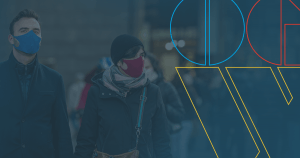Open Government Reforms Need to Protect Whistleblowers
Las reformas de gobierno abierto deben proteger a los denunciantes
This blog is part of a series of thematic blogs produced by the Independent Reporting Mechanism (IRM) during Open Gov Week. Find other blogs in the series here.
At its heart, whistleblowing is about speaking up against wrongdoing and corruption. The headlines might focus on multinational organisations – think Panama Papers or Danske Bank – but a whistleblower might also report cases of bribery in a local government office in a small town. Their bravery at any level helps to ensure accountability in public life. They put their livelihoods and sometimes even their lives (and that of their family’s) on the line to speak up against corruption, waste, fraud, and abuse of public office. It is only right that these people have the appropriate protections in place.
At the Open Government PartnershipThe Open Government Partnership (OGP) is a multi-stakeholder initiative focused on improving government transparency, ensuring opportunities for citizen participation in public matters, and strengthen... More (OGP), over 20 participating countries have recognised the importance of protecting whistleblowers by advancing reforms through their OGP action plans. From Ireland to Uruguay, Tunisia to Australia, there have been over 50 different commitments made since 2011. The OGP’s Independent Reporting Mechanism has assessed over half of these commitments as having moderate or transformative potential for results.
OGP Members with Whistleblower Commitments
- Albania
- Australia
- Czech Republic
- Denmark
- France
- Ghana
- Greece
- Croatia
- Ireland
- Italy
- Liberia
- Latvia
- North Macedonia
- Nigeria
- Serbia
- Slovak Republic
- Spain
- Tunisia
- United Kingdom
- United States
- Uruguay
In the latest round of OGP action plans, the Czech Republic, Estonia, Liberia and Spain have included promising commitments that seek to educate people about and promote whistleblowing, introduce whistleblower protection legislation, and/or develop technological solutions for anonymous reporting of wrongdoing. Latvia joined the OGP Leaders Network for its work between government and civil society to advance whistleblower protections. Many European OGP members are using their action plans to deliver on new requirements established by the 2019 European Union (EU) Directive on whistleblower protection.
Even before this legislation came into effect, countries were implementing whistleblower protections. In Ireland, new legislation introduced in 2014 empowered all working citizens to report wrongdoing, with protections not limited to the public sector. It also set in place redress mechanisms for employees that have been dismissed or penalised for reporting wrongdoing in the workplace. In Italy, the launch of an open source whistleblowing portal in 2017 led to a significant increase in the number of public employees reporting wrongdoing or corruption. One in ten of these cases were sent to the public prosecutors’ offices, and another one in ten were sent to the Court of Auditors to ascertain the existence of wrongdoing or loss of public revenue.
There are many actions that can be taken to protect whistleblowers. Recommendations for ensuring ambitious reforms that protect whistleblowers can be found in OGP’s Guide to Open Government and the Coronavirus:
- Whistleblower protectionsEnsuring that people feel encouraged and safe to report corrupt practices or wrongdoing in the workplace builds a culture of integrity and makes it easier to detect corruption. Technical specificati... should be broad in scope, extending beyond criminal behavior, to include harm to the public interest (such as in the UK), and beyond public employees, to include private sectorGovernments are working to open private sector practices as well — including through beneficial ownership transparency, open contracting, and regulating environmental standards. Technical specificat... More workers.
- Whistleblowers should be protected against any form of retaliation including civil suits and criminal prosecutions. Women may be more likely to experience retaliation, so additional gender-based protections should be considered.
- Whistleblower protection frameworks should introduce anonymous reporting channels (such as through internal or external hotlines, online portals, or compliance officers) and ensure mechanisms are highly visible, transparent, enforceable, and timely.
- Whistleblowers need access to legal remedies and representation and should have the choice to participate in subsequent investigations and be informed of the progress and outcome of investigations.
- Data and information related to whistleblowing should be disclosed regularly, such as the number of disclosures, outcomes, and prevalence of wrongdoing.
- The legislature should use its authority to oversee and provide regular monitoring of whistleblower protections.
- There should also be an independent body with the authority to investigate retaliation and improper investigations, administer sanctions, as well as provide guidance for reporting mechanisms.
As the world continues to deal with the COVID-19 pandemic, protecting whistleblowers is more important than ever to ensure efficient and ethical use of government funds in response to the crisis. Taking an open government approach to whistleblower protection is therefore essential to effectively strike the balance between swift and effective pandemic response measures, but also more widely, to ensure accountability in public life.
Este blog es parte de una serie de blogs temáticos producidos por el Mecanismo de Revisión Independiente (IRM) durante la Semana de Gobierno Abierto. Encuentra otros blogs de la serie aquí.
Denunciar irregularidades es alzar la voz en contra de actos indebidos y casos de corrupción. Aunque los titulares de los medios tienden a destacar casos relacionados con organizaciones multilaterales (como el caso de los Panama Papers o el Danske Bank), un denunciante también puede ser aquél que reporta un caso de soborno en la oficina de un gobierno local de una pequeña localidad. A cualquier nivel, su valentía ayuda a asegurar la rendición de cuentas de la vida pública. Estas personas arriesgan su trabajo e incluso sus vidas (y la de sus familias) para alzar la voz en contra de la corrupción, el desperdicio de recursos, los fraudes y abusos de los cargos públicos. Lo justo es que estas personas tengan la protección que necesitan.
Hasta la fecha, más de 20 miembros de la Alianza para el Gobierno Abierto (OGP por sus siglas en inglés) han reconocido la importancia de proteger a los denunciantes, promoviendo reformas a través de sus planes de acción de OGP. Desde Irlanda hasta Uruguay y desde Túnez hasta Australia, desde 2011 se han establecido 50 compromisos relacionados. Según las evaluaciones realizadas por el Mecanismo de Revisión Independiente de OGP, más de la mitad de estos compromisos han tenido un potencial moderado o transformador.
Miembros de OGP con compromisos de denunciantes
- Albania
- Australia
- República Checa
- Dinamarca
- Francia
- Ghana
- Grecia
- Croacia
- Irlanda
- Italia
- Liberia
- Letonia
- Macedonia de Norte
- Nigeria
- Serbia
- República Eslovaca
- España
- Túnez
- Reino Unido,/li>
- Estados Unidos
- Uruguay
En la más reciente ronda de planes de acción de OGP, la República Checa, Estonia, Liberia y España han incorporado compromisos prometedores que buscan educar a las personas acerca de la protección a denunciantes, proponer legislaciones para protegerlos y/o desarrollar soluciones tecnológicas para poder enviar reportes anónimos en caso de detectar irregularidades. Letonia se incorporó a la Red de Líderes de OGP por su colaboración entre el gobierno y la sociedad civil por impulsar protección a denunciantes. Muchos países de OGP están utilizando sus planes de acción para cumplir con sus obligaciones adquiridas en el marco de la directiva de la Unión Europea sobre protección a denunciantes.
Incluso antes de que esta legislación entrara en vigor, algunos países ya estaban implementando acciones de protección a denunciantes. En Irlanda, una ley aprobada en 2014 empoderó a la ciudadanía a reportar irregularidades, incluso en el sector privado. Además, estableció mecanismos para compensar a los empleados que han sido despedidos o castigados por reportar irregularidades en sus trabajos. En Italia, el lanzamiento de un portal de denuncias en 2017 llevó a un aumento significativo del número de empleados púbicos que reportaron irregularidades o casos de corrupción. Uno de cada diez casos fueron enviados a las oficinas de los procuradores y uno de cada diez fueron enviados a la corte de auditores para confirmar la existencia de irregularidades o pérdida de fondos públicos.
Hay muchas medidas que los países pueden tomar para proteger a los denunciantes. En la guía de gobierno abierto y el coronavirus publicada por OGP, puedes encontrar recomendaciones para asegurar reformas ambiciosas para proteger a los denunciantes.
- Las protecciones a denunciantes deben ser amplias, abarcando no solo las conductas delictivas, sino también daños al interés público (como en el caso del Reino Unido) y no solo a los servidores púbicos, sino también a los empleados del sector privado.
- Los denunciantes deben protegerse de toda forma de represalias incluyendo las demandas civiles y persecuciones penales. Debido a que las mujeres tienen mayor probabilidad de sufrir represalias, deben incluirse consideraciones de género.
- Los marcos de protección a denunciantes deberán incluir canales anónimos de denuncias (por ejemplo líneas telefónicas internas o externas, portales digitales o funcionarios) y asegurar que los mecanismos sean visibles, transparentes, aplicables y oportunos.
- Los denunciantes requieren de recursos y representación legal y deberán tener la opción de participar en las investigaciones subsecuentes y de mantenerse informados de los avances y resultados de las investigaciones.
- Los datos y la información relacionados con las denuncias deben ponerse a disposición del público regularmente, por ejemplo la cantidad de casos, los resultados y la prevalencia de irregularidades.
- La legislatura deberá utilizar su autoridad para supervisar y monitorear las protecciones a denunciantes
- Debe establecerse un organismo independiente con la autoridad de investigar represalias e investigaciones inadecuadas, administrar sanciones y ofrecer pautas sobre mecanismos de reporte.
El mundo sigue lidiando con la pandemia del COVID-19 y en ese contexto la protección a denunciantes es más importante que nunca, pues ayudará a asegurar que los fondos de respuesta a la crisis se utilicen de forma eficiente y ética. Por lo tanto, es fundamental impulsar un enfoque de gobierno abierto para encontrar el equilibrio entre una respuesta ágil a la pandemia que al mismo tiempo asegure la rendición de cuentas de la vida pública en general.
No comments yet
Related Content

Open Gov Week 2021
From May 17-21, join open government champions from around the world to share ideas, discuss solutions, and commit to new levels of citizen participation in government to respond to and…

A Guide to Open Government and the Coronavirus: Whistleblower Protection & Scientific Integrity
Governments around the world are circumventing standards of sound public management and scientific processes in the rush to respond to the COVID-19 pandemic. In the context of a rapidly unfolding…



Leave a Reply